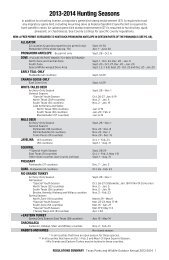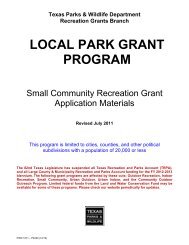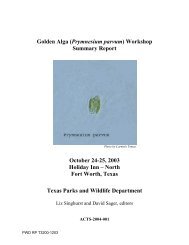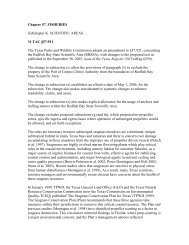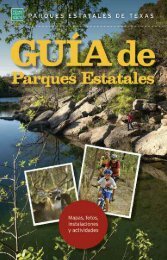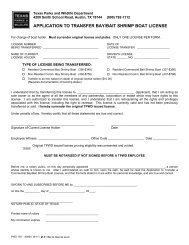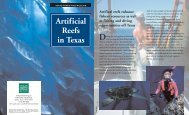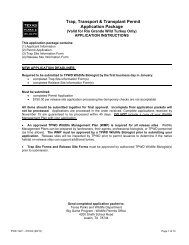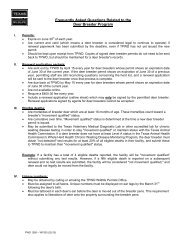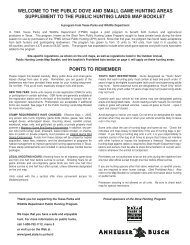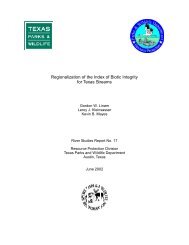1-1 Appendix 1 Responses to survey questions administered to ...
1-1 Appendix 1 Responses to survey questions administered to ...
1-1 Appendix 1 Responses to survey questions administered to ...
You also want an ePaper? Increase the reach of your titles
YUMPU automatically turns print PDFs into web optimized ePapers that Google loves.
used for any specific purpose. The objective of collecting such data becomes “<strong>to</strong><br />
meet the standard requirement”. Within Inland Fisheries, we have fallen victim <strong>to</strong><br />
this process. Most of our standard assessment procedures are required, yet the<br />
data collected are often not used or inadequate <strong>to</strong> meet true objectives.<br />
Additionally, because we have essentially standardized objectives, many of our<br />
managers no longer question the methods used and therefore little effort is made<br />
<strong>to</strong> improve them.<br />
• Weakness – standardization seems <strong>to</strong> be a reactionary tactic, implemented <strong>to</strong><br />
control proliferation of data, rather than as a means of collecting data needed for<br />
specific, agreed-upon objectives.<br />
• Weakness – Biologists lose their ability <strong>to</strong> take advantage of their “feel” for the<br />
resource.<br />
• The greatest weakness lies in people getting complacent in performing minimum<br />
effort and standard tasks, and failing <strong>to</strong> investigate or striving <strong>to</strong> push for<br />
improved strategies or methodologies. Standardized procedures are needed along<br />
with the flexibility <strong>to</strong> go beyond minimum standards or break the bureaucratic<br />
inertia and continually find better methods.<br />
• Weakness: In the absence of good practical judgement skills, safety issues could<br />
develop (particularly electrofishing) during sampling. Restricts biologist from<br />
deviating for prescribed procedures where cus<strong>to</strong>mization might be more practical<br />
and appropriate.<br />
• Weakness: May create a “do only the minimum/standard attitude.”<br />
• Weakness: Entices biologists and administra<strong>to</strong>rs in<strong>to</strong> a model where thinking is<br />
optional and any data are good data.<br />
• Trying <strong>to</strong> apply a standard procedure <strong>to</strong> any objective just because the standard<br />
exists and not because it is the best procedure – weakness.<br />
• Weakness – Lack of flexibility that takes away from objective-based<br />
management.<br />
• Although standardized assessment procedures provide for continuity of data over<br />
time, they create a lack of flexibility <strong>to</strong> answer specific or unique <strong>questions</strong>.<br />
• The drawback is that from time <strong>to</strong> time, specialized alternatives are needed <strong>to</strong><br />
answer specific <strong>questions</strong> about our fish populations that our standardized<br />
procedures may not adequately.<br />
• The greatest weakness is that there are occasions that what works in one area of<br />
the state does not work in another. Flexibility is needed sometimes <strong>to</strong> achieve<br />
your goal when standardized methodology does not work.<br />
INLAND NON-ADMINISTRATIVE--QUESTION 3<br />
RESPONDENTS: 35<br />
What is the most pressing issue anticipated in the next 10 years that will require<br />
science-based input from the agency?<br />
• Texas has far <strong>to</strong>o little water and manages water issues with archaic concepts and<br />
good-old-boy and big-money logic. This issue will strike not only sport and<br />
2-31



